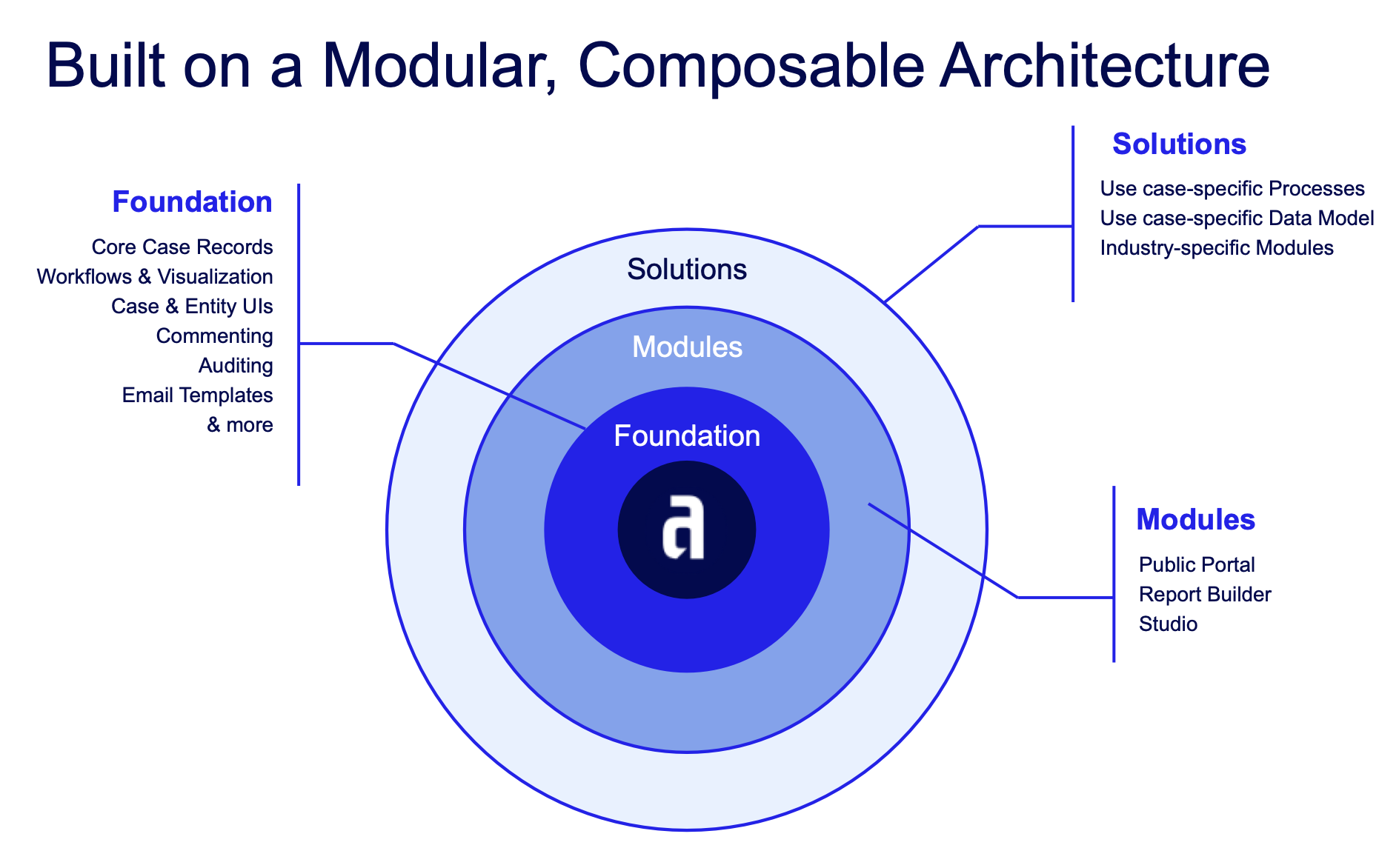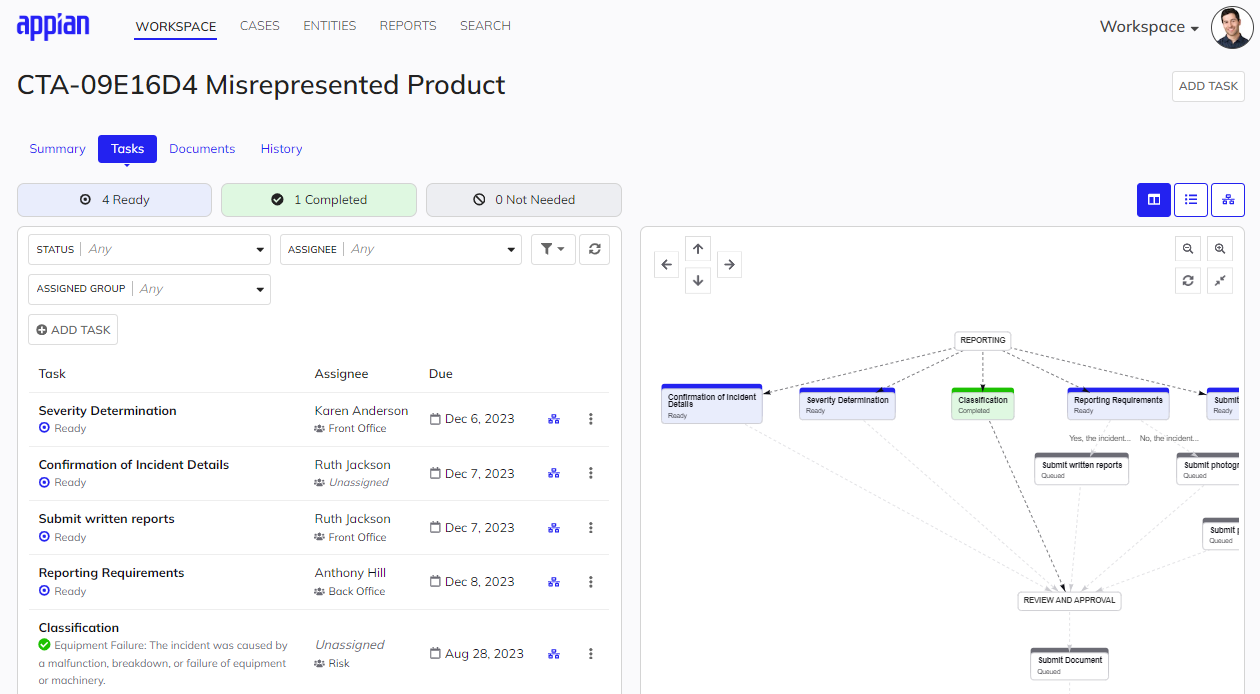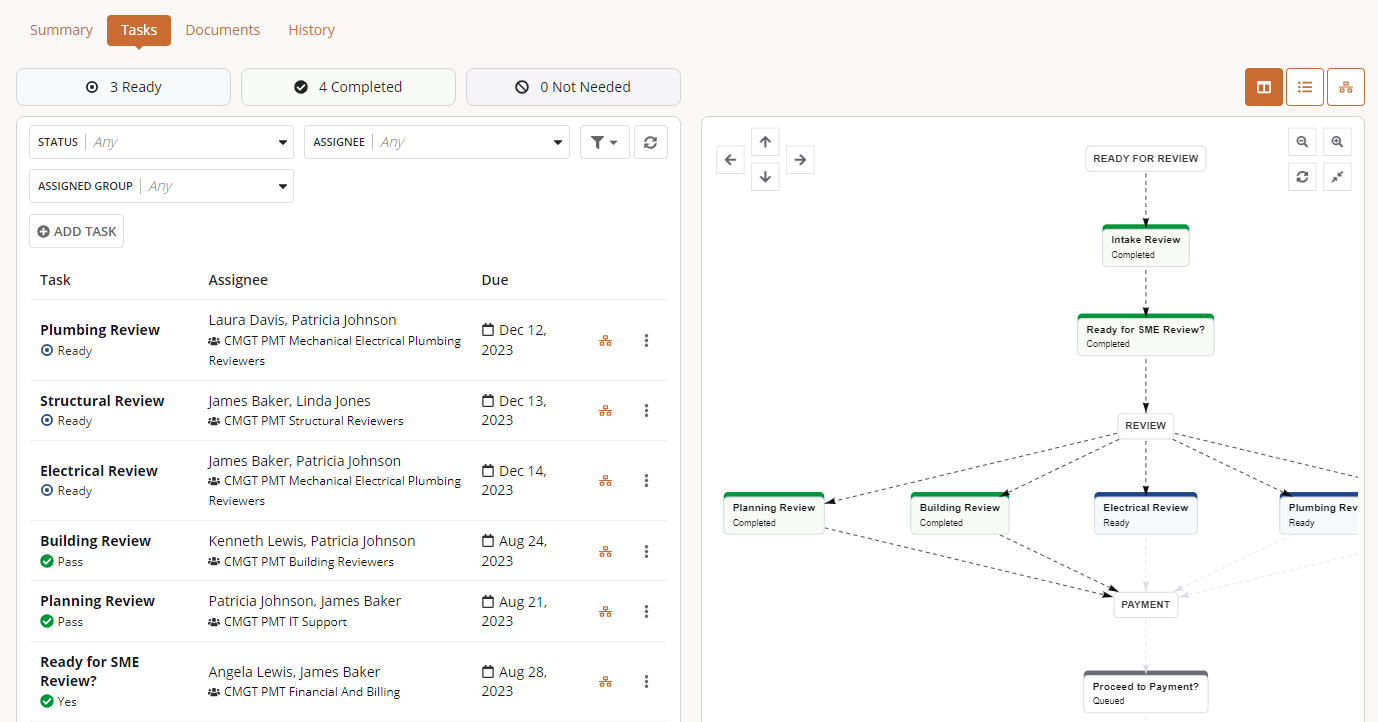| The capabilities described on this page are included in Appian's advanced and premium capability tiers. Usage limits may apply. |
IntroductionCopy link to clipboard
Appian Case Management Studio (CMS) for Public Sector is more than just a basic case management workflow application. It combines the best features of Appian into a single application that allows caseworkers and managers to focus their attention on the specific requirements of their organization's case management workflow.
CMS is built on the Appian low-code platform with a modular design that enables customization and supports application extension by incorporating future feature upgrade modules. This modern design approach enables you to create purpose-built case management applications without lengthy development timelines.
So what does Appian Case Management Studio for Public Sector offer? It provides one central location for caseworkers and managers to manage and track the activities and data for all case types, from case intake through case resolution. Leveraging Appian Portals, it also connects users to the organization handling their case through a self-serve interface that enables them to submit requests, incidents, or complaints without requiring them to call or reach out to someone on your case management team via email. For example, an organization can use Appian CMS to create an incident management application for their information technology (IT) department while sharing the same CMS building blocks to create a separate complaint management application for their service department.

With Appian CMS for Public Sector, your organization will save time and money with configurable workflows that can be adapted to fit specific process needs. The application features a case workspace, case records, workflow visualization, conditional tasking (branching logic), and document management that empower caseworkers and managers to make better decisions. Email notifications, tracking, reporting, and auditing features give your team greater visibility into each case's status and progress, covering everything in between.
In addition, the following modules ship with the Appian CMS:
This guide provides a quick overview of all the benefits of Appian CMS for Public Sector and why it's the best option to help you streamline and manage your case management lifecycle.
Simplify, accelerate, and modernize case managementCopy link to clipboard
Case management can be daunting for everyone involved, from submitting a case to your organization to assigning a case to someone on your team. How do you know who to talk to for case information and updates? And the most important question is how long does it take to resolve an issue?
What if you could take the guesswork out of the entire process and simplify it for your case management team and end users?
Appian CMS for Public Sector addresses these questions by reducing the number of touch points in the user journey. With CMS, your external users can access the information and processes they need to submit a case and follow it through the entire process. After a case enters your workflow, it's not lost. CM gives your team the tools and information to connect each case to the right people, tasks, workflows, and views to track the case through the entire process effectively.
Streamline Case IntakeCopy link to clipboard
You can configure CMS to systematically route cases to the correct department, so smaller offices can streamline the case intake process and optimize workflow efficiencies. Instead of spending time on the phone or manually monitoring an inbox for incoming requests, your caseworkers can use that time to resolve cases.
Intuitive and Modern Views and User InterfacesCopy link to clipboard
CMS offers a fresh approach to managing your case management process, simplifying the connection points between users and your case management team. Intuitive and modern user interfaces provide the views and data caseworkers need to make decisions, complete tasks, give feedback to users, and request additional information or documentation required to process and resolve cases. Convenient and accessible resources give users the information they need to understand where they are in the process and what comes next.

The Case Workspace is the primary site where caseworkers perform their core responsibilities. It includes all of the main user interfaces designed to be extended and customized as required.
| VIEWS & INTERFACES | DESCRIPTION |
|---|---|
| WORKSPACE | Landing page that gives caseworkers access to all assigned cases/tasks, key performance indicators (KPIs), the latest updates on assigned cases, quick actions linking to commonly used functionality, and a calendar view of upcoming due dates. |
| CASE RECORD LIST | A searchable and filterable case record list provides a view of all cases to the user who has access. |
| CASE RECORD VIEW | View of case details, due dates, tasks, comments, related cases and entities, watchers, tags, and documents. Additional tabs show document management, auditing/history, and a detailed view of tasks, including workflow visualization. |
| ENTITY RECORD LIST | View all defined entities (people, business, things) with separate tabs sorting entity types. |
| ENTITY RECORD VIEW | View of a specific entity, with all metadata shown, related entities, related cases, and any attached documents. |
| REPORTS | Allows users to view all pre-built reports they can access and use the Report Builder module to create their reports. |
Highly Configurable Set Up and ManagementCopy link to clipboard
Appian Case Management Studio is highly configurable, allowing business administrators to configure the base application quickly to meet their organization's needs. CMS supports a wide range of use cases so your organization can manage many different case types in a single application.
The Studio module enables the creation of multiple case types with flexible workflows that can handle complex branching or loopback scenarios through conditional (decision point) tasks. Additionally, CMS allows you to easily create and modify workflows for all future instances of each case type. For specific case instances, CMS can accommodate definitions dynamically with exception handling in the bounds of the system.
Conditional tasking and workflow visualizationCopy link to clipboard
CMS allows you to dynamically change the task workflow for an individual case by adding or removing tasks in any section of the predefined flow. You can add new tasks sequentially to capture a specific process, such as an escalation workflow. Finally, the task workflow also includes a visualization of the overall case process that updates in real-time as you add, remove, or complete tasks.

Extend CMS capabilities with modulesCopy link to clipboard
Modules that ship with the Appian Case Management Studio base application enable customers to extend the capabilities and functionalities of their case management solution over time.
Report Builder moduleCopy link to clipboard
The Report Builder module enables privileged users to create reports that can be saved to a dashboard for frequent use, generated on demand and shared with others. Once incorporated with CMS, the Report Builder module allows caseworkers to select a data source and use it to construct different report types with no code involved. Additionally, caseworkers can create reports with flexible filters that allow for real-time and historical reporting.
Studio moduleCopy link to clipboard
The Studio module provides business admin users an intuitive user experience to manage reference tasks, task blocks, and workflows from the CMS front end. Once incorporated with their CMS, these users can:
- View a real-time workflow visualization while making changes.
- View, create, edit, and deactivate reference tasks, task blocks, and workflows.
- Order a workflow's tasks, their assigned groups, SLA, task dependents, requiredness, and conditional routing.
- Configure workflow task dependents.
- Configure case flow milestones.
Get started nowCopy link to clipboard
Ready to get started with Appian CMS for Public Sector? Take the next step towards unlocking all the power, capabilities, and benefits CMS has to offer by downloading and installing CMS.
See the Appian CMS for Public Sector Support Policy to learn more about support coverage for Appian CMS for Public Sector.
